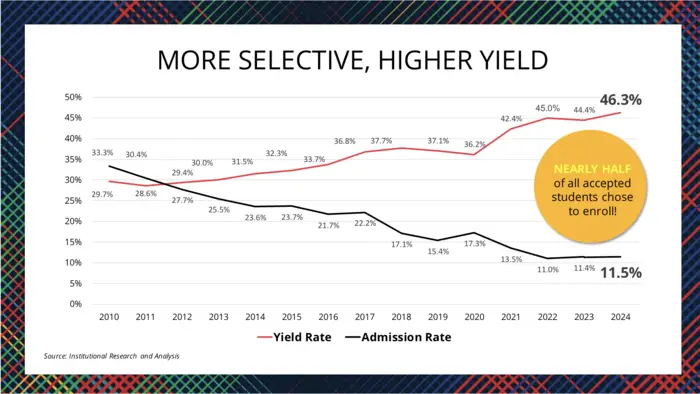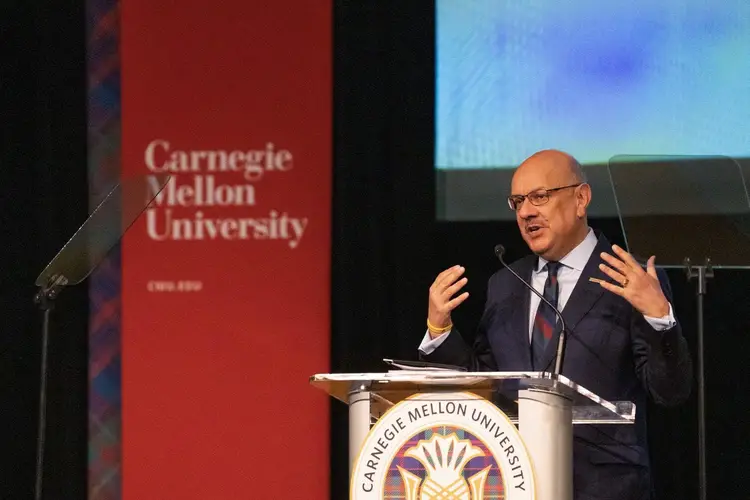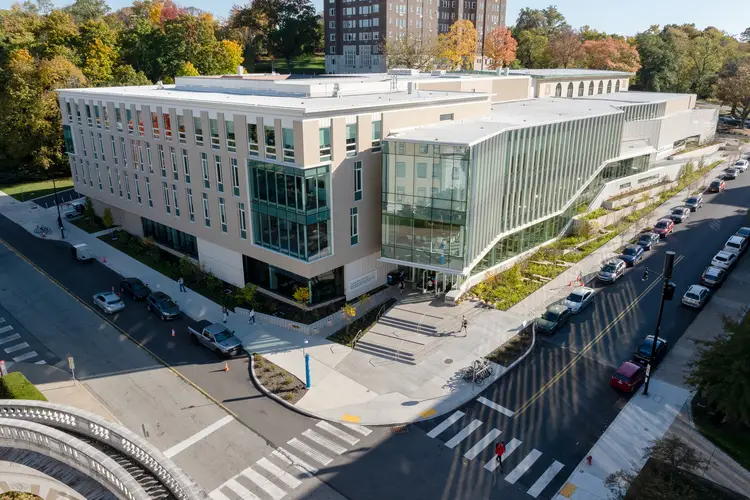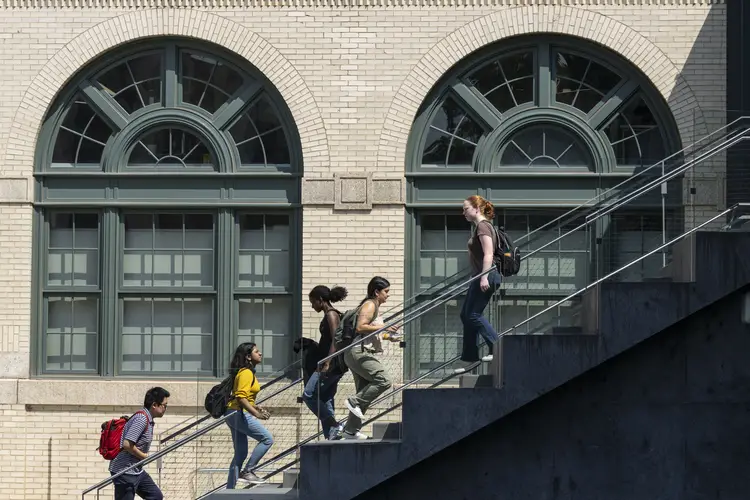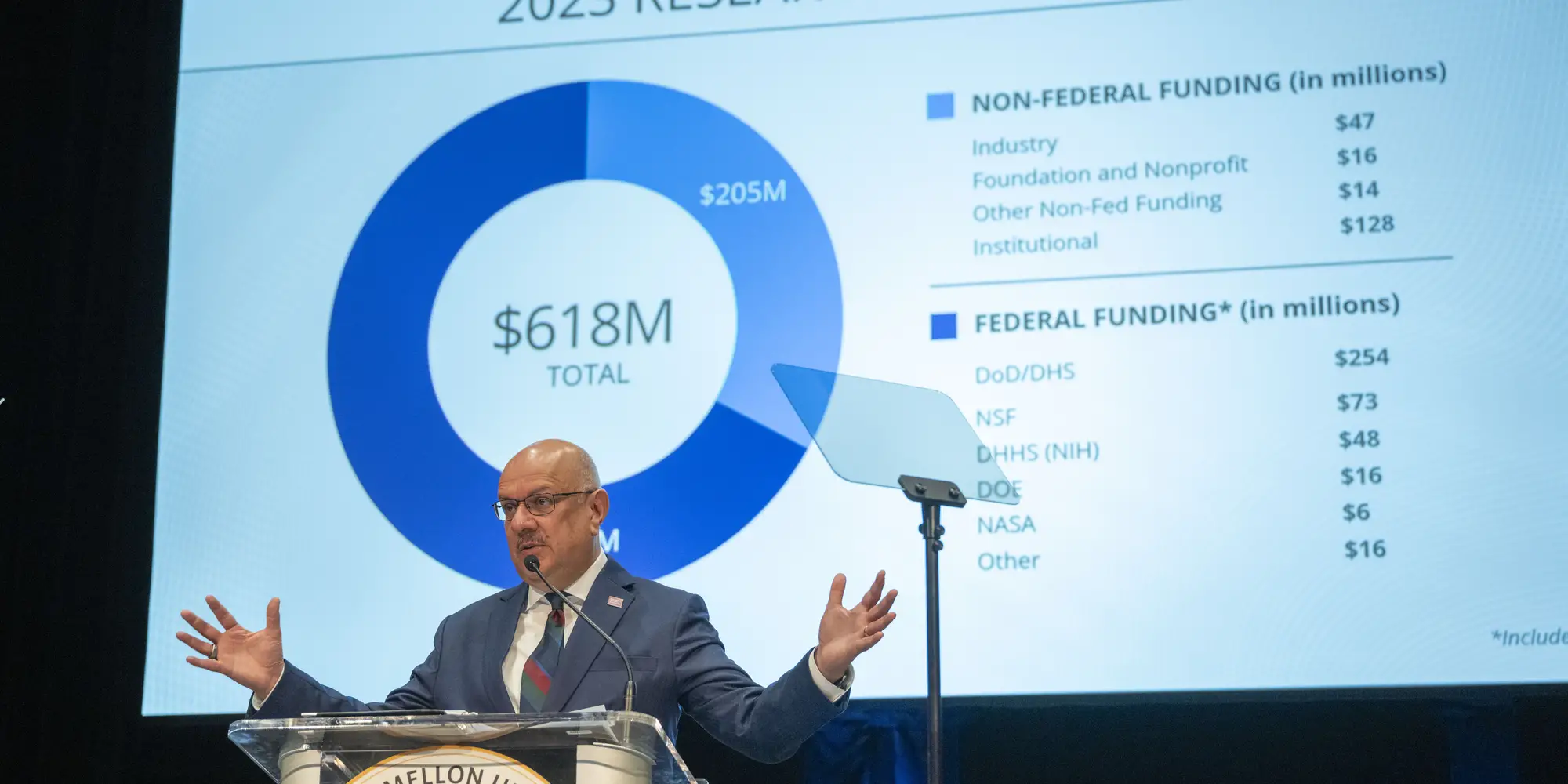
State of the University Address Highlights CMU’s Strength in Higher Education
On Nov. 18, the Carnegie Mellon University community gathered in the Cohon University Center's Rangos Ballroom to hear President Farnam Jahanian discuss the status and future of Carnegie Mellon. The event was also live streamed.
"It's wonderful to be with you this afternoon," Jahanian said following opening-remarks from Lowell Taylor(opens in new window), chair of the Faculty Senate(opens in new window) and H. John Heinz III University Professor of Economics at the Heinz College of Information Systems and Public Policy(opens in new window). "I'm delighted to have this opportunity to share updates from across the university and articulate an ambitious vision for our continued growth and leadership in the years ahead. This vision is really informed by my conversations with you, and, of course, support of the academic and administrative leadership of the university."
Jahanian's presentation discussed the ways in which CMU is driving innovation and societal growth at all levels of the university, and how the university is meeting the unique challenges that higher education is facing as a whole.
"There's no question that higher education has become increasingly politicized in recent years. Undoubtedly, we will face new challenges ahead, and some of the headwinds that higher education has been managing will no doubt intensify. But I believe more than ever in the mission and pivotal role of higher education in society," Jahanian said. "CMU is well positioned to contribute to our nation's prosperity at this critical time."
To illustrate this, Jahanian showcased university's growth and stability. For instance, CMU has seen higher rates of accepted students choosing to enroll — over 46.3% in 2024, up from 29.7% in 2010 — despite a more selective admissions process.
The university saw an increase in enrollment in its degree-granting programs after 2019, with a total of 14,744 students attending the university across its undergraduate and graduate programs (up from 13,278).
Jahanian then gave an update on the financial status of the university, which included the announcement of a AA+ credit ranking by S&P Global — the highest in CMU history — reflecting a "very strong capacity to meet financial commitments."
Following this, he spoke about several leadership and staff updates, including the appointment of James H. Garrett Jr.(opens in new window) to a second five-year term as provost, the appointment of Martial Hebert(opens in new window) to a second term as dean of the School of Computer Science, and the appointment of Barbara Shinn-Cunningham(opens in new window) as dean of the Mellon College of Science.
Updates to the employee profile were also showcased, with a total of 5,192 employees across all sites. Gen Z or the Millennial Generation make up 54% of current Carnegie Mellon employees, while women represent 45% of academic leadership positions at CMU.
Later in the presentation, Jahanian framed the discussion of the university's progress and goals in the context of four key pillars, or institutional priorities: driving the future of education; enhancing the CMU experience; leading at the nexus of technology, science and society; and broadening the university's societal, cultural and economic impact.
Driving the future of education
Jahanian started by addressing the rapidly changing pace of technology across industries and sectors, and the importance of equipping students for success in the coming years.
"Today, colleges and universities must prepare students for careers that don't even exist," he said. "Higher education is evolving, courtesy of unprecedented workforce and technological disruptions."
While Carnegie Mellon is known for its rich history and excellence in the fields of computer science, engineering, AI and the arts, Jahanian explained that the university has taken steps to provide holistic educational support for students in all areas of their lives.
"As we navigate the future of education, several strategies have guided our path. For example, we're imagining curriculum for the digital age, including digital competencies, but also integrating human skills such as communication, critical thinking, entrepreneurship — just to name a few — into our curriculum."
Recent efforts by the university include the newly introduced Core@CMU course, which teaches undergraduates career-defining skills such as collaboration, communication and data literacy.
Jahanian highlighted the ongoing work of existing programs, as well as the introduction of new online graduate-level certificate programs in areas like machine learning(opens in new window), data science(opens in new window), 3D bioprinting and biofabrication(opens in new window).
Enhancing the CMU experience
In addition to discussing the success and growth of the university in the academic space, Jahanian spoke about the ways in which the university has worked to provide students with grounding in their personal and professional lives as well, particularly through on-campus resources.
"We remain committed to taking a holistic approach to student success and well-being," Jahanian said regarding the second pillar. "And I think you've heard me and other members of the leadership team talk about this. We're asking a simple question: How do we develop the whole person?
Commending the work of Gina Casalegno(opens in new window), vice president for Student Affairs and dean of students, Jahanian spoke about the many ways in which Carnegie Mellon has worked to support students not just academically, but in all areas of their lives.
"We have significantly expanded support services and resources aimed at fostering student success and enhancing their time on campus," he said. "We're ensuring all students have the tools they need to thrive, including opening an Academic Success Center(opens in new window) under our provost’s leadership."
Jahanian noted the opening of two new residential halls on campus and the renovation of several others. He also mentioned the recent ribbon-cutting of the Highmark Center for Health, Wellness and Athletics(opens in new window), a brand-new facility built at the site of the former Skibo Gymnasium.
"The center is designed to be a hub of clinical health and wellness services, as well as of CMU athletics programming. It's a stunning facility. It's already transformed campus life," he said.
Leading at the nexus of technology, science and society
"The demand for CMU's strength in emerging technologies and cutting-edge science has never been greater," Jahanian said as he introduced the third pillar. "Our faculty researchers and students continue to work across disciplines to create and leverage knowledge for society's gain."
Jahanian spoke about the many ways in which Carnegie Mellon has stood at the forefront of technological innovation, not only through its research, but through the role the university has played in bringing leading expertise to Washington, D.C.
“More than ever before, our faculty members are serving as the go-to source for shaping and advancing the nation's agenda on research and innovation,” he said. “This has led us to a moment that is tailor made for Carnegie Mellon. It's occurring through federal appointments in the Biden administration, testifying on the hill, advising lawmakers and, of course, leading research initiatives and federally funded research centers.”
During the presentation, he provided insight into the university's research expenditures — funds received from external sources to be used on research — which totaled $618 million from federal and nonfederal sources. The university’s continued growth in expertise and resources, Jahanian said, will continue to make the university a leader at the national level.
“I expect that our influence in setting the research and education agenda for this country will continue,” he said.
Broadening societal, cultural and economic impact
Finally, Jahanian spoke about the ways in which the university continues to increase its impact.
"CMU has always stood apart thanks to our profound commitment to shaping society through collaborative discussion, research and creative inquiry," he said. "CMU supports nearly 18,000 jobs directly and indirectly across the state of Pennsylvania, and our estimated economic impact is about $2.7 billion. In the last decade or so, Tartans have also launched over 500 startups."
"While these companies are located all around the country, there's no doubt that we're disproportionately contributing to the innovation ecosystem here in Western Pennsylvania," he said. "In addition to the startups and spinoffs, there are a number of companies that have moved or expanded operation in Pittsburgh just to be near and working with Carnegie Mellon."
One such company is Google, whose offices in nearby Bakery Square were a focal point of the day during the Alphabet CEO Sundar Pichai’s visit to Carnegie Mellon University on Sept. 18. The visit, which was the first entry in the 2024-25 President’s Lecture Series, is one of many that brings industry leaders and changemakers to campus to speak with Jahanian and the CMU community on prevalent topics.
Following the presentation, Jahanian fielded questions from the audience via a live panel. Topics included Carnegie Mellon's commitment to diversity, equity and inclusion, parking and what CMU might look like 10 or 15 years in the future.
Addressing the last question, Jahanian left the audience with a message of hope and pride for the work being done at Carnegie Mellon.
"I really do believe in what CMU contributes to the world. It's so critical to society. My ambitions for this institution are as huge as yours. I hope my presentation at least partially convinced you that we're well positioned to be at the forefront of society's evolution.
"If you see the kind of work that we do and the kind of students that we produce and the demand for our students, there's no question that we have what the world needs — in our education, in our research, in our creative work, and certainly in our economic and cultural impact," Jahanian said.
